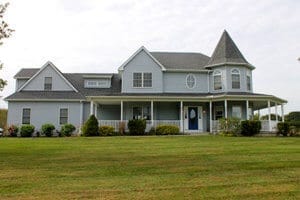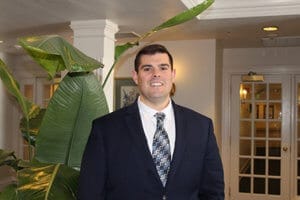
Ashley Young Adult Extended Care Program Enhanced, Moves Off-Campus
Over the last few months, Ashley clinicians have been enhancing and revising our three main programs. This article profiles enhancements to the newest of these programs, the Young Adult Extended Care Program.
In January, 2015, we debuted an inpatient treatment program specially designed for young adults ages 18 – 25. It became evident that for many of our younger patients, the standard 28-day program was not enough. To increase support for long-term recovery, Ashley created a 60-day Young Adult Extended Care Program for males in this age group, which was launched in July 2016.
 Individualized treatment plans focus on identifying underlying factors that contribute to substance use disorders. Through innovative clinical modalities, training in life-skills, and 12-step immersion activities, we motivate and guide young men to become strong, active family and community members.
Individualized treatment plans focus on identifying underlying factors that contribute to substance use disorders. Through innovative clinical modalities, training in life-skills, and 12-step immersion activities, we motivate and guide young men to become strong, active family and community members.
Assistant Program Director, James Ryan said, “Our 28-day program focuses on the clinical elements of addiction and less on life-skill development. The Extended Care Program is the reverse.”
Some of these life-skill training modules include:
- Relationships in Recovery
- Financial Planning
- Social Media Management
- Nutritional Education and Meal Planning / Prep
- Employment Preparation
- Civility, Communication and Conflict Resolution
“These are just a few of the interactive training sessions that will help prepare our young adults to successfully navigate the world following treatment,” Ryan said. “This is critical to avoid a return to familiar patterns of behavior that can easily lead to relapse.”
In addition to the life-skills training, the Extended Care Program emphasizes healthy recovery activities, as it has been proven that integration and participation in 12-step and other recovery programs are linked to an increase in long-term sobriety. Recommended recovery activities include:
- On and off-campus 12-step meetings
- Big Book and 12-step studies
- AA / NA events
- Temporary sponsorship and step work
The Extended Care Program also emphasizes the development of “life balance” and ways to have fun and experience life substance-free. Sober Saturday activities in the Program include kayaking, bowling, movies, museum visits, and much more.
But perhaps the most unique aspect of the Extended Care Program is that effective November 1st, these patients will have moved off campus into a new residence. The as-yet-to-be-named “house” will be a constantly supervised, community based living space. The residents will learn to manage with greater independence and will take a greater role in the maintenance and upkeep of the house. They will utilize the 12 acre grounds to plant a vegetable garden and participate in many other activities that aren’t possible on our regular campus.
Another important feature is that we stay in touch with these patients after they graduate, so that we can measure the outcomes. Said Ryan, “Our program is proving to be very effective. 92% of those that successfully completed the 60-day stay have remained sober and are doing extremely well. I’m really proud of them!”
For more information about Ashley’s Young Adult Extended Care or any of our treatment programs, visit our website at www.AshleyTreatment.org or contact our Admissions Dept. – 800-799-HOPE (4673).
Staff Spotlight: Patrick Trentalange, MSW, LCSW-C – Young Adult Extended Care Counselor
 This month we’re launching a series of articles to introduce members of the Ashley team; Patrick Trentalange, who has been with Ashley for over 4 years, has held various positions including Clinical Aide, Admissions Counselor, Pain Program intern, and currently serves as the Young Adult Extended Care Counselor.
This month we’re launching a series of articles to introduce members of the Ashley team; Patrick Trentalange, who has been with Ashley for over 4 years, has held various positions including Clinical Aide, Admissions Counselor, Pain Program intern, and currently serves as the Young Adult Extended Care Counselor.
What drew you work in this field?
What initially drew me to the field of psychology was an interest in human consciousness and how peoples’ attitudes, beliefs and behaviors shaped their reality. As I progressed through my education, I realized that I wanted to focus on working with individuals with Substance Use Disorders, as I believe they are able to utilize their experiences in active addiction as a crucible towards self – realization. I also believe that this field, in a sense, is in its infancy and holds a great deal of potential; I find this very attractive.
What drew you to work at Ashley?
I started my career at Ashley as a PSA. What initially drew me to work at Ashley was our reputation for being a leader in the addiction field in the region. As I worked my way through my masters program, I worked in Admissions and as an intern in the Pain Recovery Program. Through my time at Ashley I have been attracted to stay by the fact that we are continually reinvesting in our programing and expanding our services. I feel that Ashley has provided me with a platform to grow as a counselor and a human.
What is the most rewarding part of your job?
The most rewarding part of my job is the privilege I have to sit with my patients and walk with them through difficult emotions and memories, helping them to make sense of the world around them and how they can fit into it as a recovering person. Of course, positive outcomes are also a reward, watching someone go from mentally, physically, and spiritually bankrupt to a happy, healthy young man is something words cannot properly describe. Watching families begin to repair themselves and seeing parents and children reconnect emotionally is also very rewarding.
What makes Ashley special?
Ashley is deeply rooted in traditions, such as the 12 steps, but is also on the cutting edge of new evidence-based practices. The ability to challenge the status quo while still having access to some of the trailblazers in this field is truly something that sets Ashley apart in my eyes.
